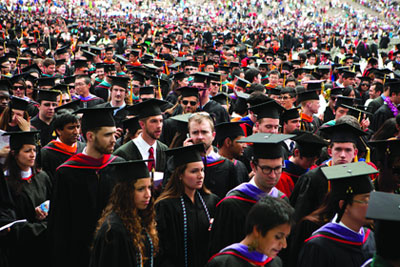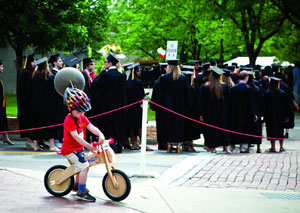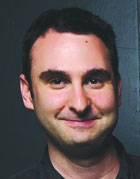NYC Tech Names Architect; Google Donates Space; Fraternity Suspended After Alleged Bias Incident; Arts Dean to Step Down; Senate Approves Calendar; Students Object; Scholar of Caribbean Lit Named Africana Director; Ithaca Campus Boasts Balanced Budget; CU Mourns Two Undergrads; Big Red Cheddar to Debut; Alum Wins Pulitzer Prize; Major Gifts for Engineering and Real Estate Program; Edwards Appointed CIO

Some 5,000 Cornellians received their degrees on Memorial Day weekend, as President David Skorton urged them to “give us all good reason to believe that the future will be better than today.” More than 37,000 people viewed the Commencement ceremonies in Schoellkopf Stadium, enjoying mostly sunny skies. “Go out there and do something remarkable,” Skorton said. “Help others realize their dreams. We believe in you. I believe in you. I am counting on you.”

The previous day, New York City Mayor Michael Bloomberg gave the Senior Convocation address in Schoellkopf. His talk included praise for the CornellNYC Tech campus on the city’s Roosevelt Island and thoughts on the Morrill Act, the legislation creating land-grant universities that President Abraham Lincoln signed 150 years ago this summer. The day before, he noted, Lincoln had signed the Pacific Railroad Act, which provided land and financing to build rail lines from the Missouri River to the Pacific Ocean. “In fact,” Bloomberg observed, “one could argue that in the span of forty-eight hours, Lincoln did more to advance American economic growth than any president before or since.”
NYC Tech Names Architect; Google Donates Space

CornellNYC Tech took some major steps forward in May, with the hiring of its inaugural architect and entrepreneurial officer and the acquisition of temporary classroom and administrative space. Pritzker Prize-winner Thom Mayne and his firm, Morphosis—architects of Gates Hall, currently under construction on the Ithaca campus—have been tapped to design the flagship building at NYC Tech, to be constructed on Roosevelt Island. The building, set to open in fall 2017, is envisioned as a net-zero energy consumer with geothermal and solar power. “Our goal is to design an iconic, landmark building that will resonate with the mission and spirit of the new campus,” says University Architect Gilbert Delgado. NYC Tech will begin classes this fall with a small group of current and previously admitted graduate students; those recruited specifically into NYC Tech will matriculate the following year.
A major goal of NYC Tech is to connect academia and industry, and the project’s initial locale will put students and faculty under the same roof as a tech behemoth: Google has donated 22,000 square feet of its New York City headquarters, located on Eighth Avenue in Chelsea, to serve as the campus’s temporary home. Tech veteran Greg Pass ’97, former CTO of Twitter and a former system architect and software engineer at AOL, has been named the campus’s founding entrepreneurial officer, charged with establishing its culture of collaboration with industry.
Fraternity Suspended After Alleged Bias Incident
A racial incident at Sigma Pi in early May put the fraternity on interim suspension, triggered an investigation by Ithaca police, and prompted protests and anti-bias events on campus. In early May, a group of black men and women reported that people on the roof of the fraternity house pelted them with bottles and cans and shouted racial insults—including references to Trayvon Martin, the African American teenager whose shooting by a neighborhood watch member in Florida sparked national outrage. In the wake of the alleged incident, the University held a series of campus events including a community forum and discussions of diversity issues; in mid-May, a group of students, faculty, and local residents marched from Sigma Pi to Day Hall to voice their demands that Cornell increase efforts to curb racism.
In early June, an out-of-town visitor to the fraternity house pleaded guilty to disorderly conduct in Ithaca City Court, admitting to throwing beer cans and making racial comments; he stated that none of the fraternity members participated or encouraged his actions. The man, a twenty-three-year-old from Florida, was fined $250 and permanently banned from campus.
Arts Dean to Step Down
Arts college dean Peter Lepage will leave his post at the end of the 2012–13 academic year. By that time, he will be the second-longest-serving Arts dean in University history, with ten years in office. A physics professor, Lepage will remain on the faculty. A search for his successor will be conducted during the upcoming year with the aim of a new dean taking office in July 2013.
Senate Approves Calendar; Students Object
Over the opposition of some students, the Faculty Senate has approved a new academic calendar. Its changes include inserting a daylong break near the midpoint of final exams; reducing study days to four from the current 4.66; establishing a new scheduling method to lower the chances of having multiple finals close together; shortening senior week by three days; making the Wednesday before Thanksgiving a full day off; creating a two-day break in February; and designating Martin Luther King Jr. Day a University holiday. According to hospitality professor Kate Walsh, MPS ’90, vice chair of the Academic Calendar Committee, “The resolution passed because faculty saw an opportunity to truly innovate how we educate in ways that could address student stress due to prolonged periods of instruction.”
However, a substantial number of undergrads have countered that the shortened senior week and lost two-thirds of a study day would have the opposite effect, and an online petition opposing the new calendar garnered more than 1,600 signatures. “While we have serious concerns about the negative impacts on mental health,” said an editorial in the Daily Sun, “the main problem that we have with the current proposal is that students were not consulted to the extent that they should have been.” The new calendar, which would likely be phased in over four years, will not be made official until it has been accepted by President David Skorton and Provost Kent Fuchs. Their decision is expected to come this summer.
Scholar of Caribbean Lit Named Africana Director

A professor of Spanish and French literature has been named director of the Africana Studies and Research Center. Gerard Aching, PhD ’92, is also a member of the graduate fields of African, African American, and Latin American studies; his area of expertise includes nineteenth- and twentieth-century Caribbean literature and intellectual history, with a focus on the relations among slavery, literary sensibility, and philosophy. He began a three-year term on July 1. In late May the center announced that its faculty will grow by 25 percent, with the hiring of two additional professors and a Swahili instructor.
Ithaca Campus Boasts Balanced Budget
Four years after posting a structural deficit of $148 million, the Ithaca campus ended the fiscal year with a balanced consolidated operating budget, University officials announced. “The achievement of a balanced consolidated budget could not have happened without the contributions from strategic, campuswide initiatives to reduce administrative cost and budget reductions shared by all units across campus,” says Elmira Mangum, vice president for planning and budget. According to the University, the budget was balanced by such factors as a staff retirement incentive program, workforce reductions, a commitment to avoiding new debt, reduced central administration, hiring and construction “pauses,” increased alumni support, and hikes in tuition and fees. Cornell had projected that if no changes were made, the deficit would balloon to more than $215 million by 2015.

Bugging Out: On Slope Day, the shell of a VW Beetle mysteriously appeared on the roof of Risley Hall—bringing to mind other classic Cornell pranks like the 1997 clocktower pumpkin.
CU Mourns Two Undergrads
A rising sophomore died of meningococcal meningitis just days after returning home for the summer. Nineteen-year-old Krista Depew ’15, an applied economics and management major and a member of Alpha Phi sorority, passed away in May at a hospital in Albany, New York. The University has said that according to state and local health departments, members of the Cornell community are not at increased risk due to Depew’s illness.
In early June, the University announced the death of thirty-three-year-old Michael Augustin, an earth and atmospheric sciences major. Augustin, who was expected to graduate in December, died of as-yet-undetermined causes at a hospital in Palo Alto, California, where he was studying on a research fellowship.
Big Red Cheddar to Debut
 The University of Wisconsin has its Cheeseheads; soon, Cornellians can show their Big Red spirit through the consumption of cheesy comestibles. This fall, Cornell Big Red Cheddar will go on sale online and in campus retail outlets such as the Orchards and the campus store. The mild white cheddar, aged for six months, will be packaged in bright red one- and two-pound wheels. In addition to being sold to the public, the cheese will be served by Cornell Dining and Cornell Catering—which go through a cumulative 2,400 pounds of mild cheddar annually.
The University of Wisconsin has its Cheeseheads; soon, Cornellians can show their Big Red spirit through the consumption of cheesy comestibles. This fall, Cornell Big Red Cheddar will go on sale online and in campus retail outlets such as the Orchards and the campus store. The mild white cheddar, aged for six months, will be packaged in bright red one- and two-pound wheels. In addition to being sold to the public, the cheese will be served by Cornell Dining and Cornell Catering—which go through a cumulative 2,400 pounds of mild cheddar annually.
Alum Wins Pulitzer Prize
Jeffrey Gettleman ’94, the New York Times’ East Africa bureau chief, has won a Pulitzer Prize for international reporting. According to the award citation, he was honored for his “vivid reports, often at personal peril, on famine and conflict in East Africa, a neglected but increasingly strategic part of the world.” In the spring of 2011, Gettleman came to campus to speak about being kidnapped—along with his wife, Times online producer Courtenay Morris ’94, and another colleague—while reporting on Somali rebels in Ethiopia. They were released after a week in prison.
Major Gifts for Engineering and Real Estate Program
The Engineering college has received a $10 million gift in support of undergraduate education. It comes from John Swanson ’61, MEng ’63, founder of ANSYS, a firm that makes software for engineers and designers. Half of the gift is earmarked for student project teams that design and build such things as race cars and autonomous submarines, with the rest for scholarships and other initiatives. The Program in Real Estate also received a major gift: $11 million from Richard Baker ’88 and his wife, Lisa. It more than triples the endowment of the program, which will be renamed in their honor. The Bakers are owners of the Hudson’s Bay Company, the world’s oldest continuously operated retail firm.
Edwards Appointed CIO
A. J. Edwards, the University’s interim chief investment officer since May 2011, has been appointed to the position on a permanent basis. His job entails leading a team of investment officers and analysts responsible for management of Cornell’s $5.3 billion endowment, in collaboration with the investment committee of the Board of Trustees. He has been with the University since 2008.


